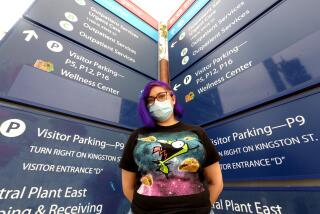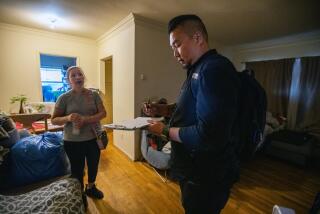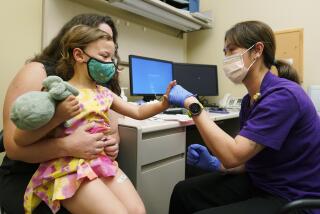Dr. Joseph D. Teicher; Psychiatrist, Director of Child Guidance Clinic
- Share via
Dr. Joseph D. Teicher, an expert in teenage suicides who helped develop the Child Guidance Clinic of Los Angeles and directed County-USC Medical Center psychiatric services for children, has died at 88.
Teicher, who retired and moved from Los Angeles in 1979, died Aug. 18 in San Diego after spending several years in an El Cajon retirement home.
Born in New York City and educated at Columbia and New York universities, Teicher began his long career in psychiatry with youngsters in 1947 when he established a child guidance clinic at St. Luke’s Hospital in New York. After five years as director of that clinic, he relocated to Los Angeles to teach at USC and to take over the struggling, neophyte Child Guidance Clinic.
Teicher wasted no time in recruiting major support for the clinic, then at 1325 W. Adams Blvd., staffed by only seven, and supported almost entirely by the charitable fund-raising group Community Chest, a forerunner of United Way.
“It just leaves me with my mouth hanging open to find such meager facilities here for the care of children with problems,” the ex-New Yorker lectured groups of well-heeled Angelenos shortly after his arrival in 1952. “This is the second oldest child guidance clinic in the United States, and Los Angeles is the third largest city. Yet see what we have; rather, let’s see what we have not!”
Teicher organized a women’s fund-raising auxiliary to augment the clinic’s meager budget and formed alliances with USC, UCLA and Childrens’ Hospital to increase staff. As the clinic grew, he worked in other areas to help parents better guide children in the difficult task of growing up.
In 1953, the doctor, who went on to write more than 100 articles for medical journals and chapters for several textbooks, published a popular parenting book: “Your Child and His Problems.” A Times reviewer evaluated it as “a practical handbook and an authority to consult in time of conflict,” adding: “Dr. Teicher seems to have done a major service for confused but conscientious parents.”
Teicher spoke before community groups as well as medical conferences, and became a familiar source for how-to-parent articles in The Times and other publications--explaining such mysteries as how play was important in transforming children into emotionally mature adults, and how toys could help.
“Choose a toy that will stimulate and provoke the child’s fantasies,” he suggested in a Times article in 1960. “It should be simple enough and provocative enough to bend his own interests so he can clothe the toy or enact with it whatever he desires.” Teicher suggested specific examples: dolls, finger paints, clay, blocks, punching bags, balloons and simple tools like wood, saws and hammers.
In 1960, Teicher added to his USC teaching responsibilities at County-USC Medical Center by becoming the hospital’s director of children’s and adolescents’ psychiatric services.
Teicher studied and became expert on teenage depression and suicide, sharing what he learned with parents through any available forum.
“They’re not all rebelling just for the sake of rebelling,” he said of teenagers during the era of anti-Vietnam War demonstrations. “As they see it, they’re trying to reestablish values and rights of the individual, and to make the world a better place.
“If a teenager causes trouble, look at the trouble two ways,” he said. “One, as that it’s his way of adapting to or solving a problem even though it may not be a good way. And second, as a signal for help. Misbehavior is a cry for help.”
In the late 1960s, when national statistics listed suicide as the fourth leading cause of death among teenagers, Teicher studied teenagers brought to County-USC after suicide attempts. Common among them, he found, were a long-standing history of family problems, marked behavior problems such as rebellion, withdrawal and lying, and often a failed, one-sided romance representing the desperate teenager’s final attempt to establish a human bond.
“Everyone paints the years of adolescence as golden,” Teicher said. “That’s bunk. It’s sheer murder growing up.”
After his retirement from USC and County-USC Medical Center, Teicher worked in private practice, on the staff at Eisenhower Medical Center in Rancho Mirage and as chief of clinical services at the Desert Community Mental Health Center in Indio.
He served in the Navy Medical Corps during World War II.
Widowed by the death of his wife, Alice, Teicher is survived by one son, David, of Minneapolis, Minn., and two grandsons. Another son, Jon, preceded him in death.
The family has asked that any memorial contributions be made to the USC School of Medicine or to the New York University College of Medicine.
More to Read
Sign up for Essential California
The most important California stories and recommendations in your inbox every morning.
You may occasionally receive promotional content from the Los Angeles Times.













